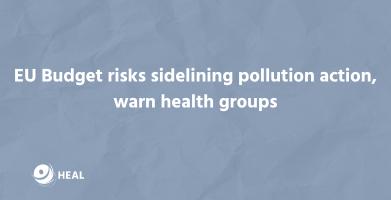In 2025, HEAL welcomed several new organisations into its international network of over 70 members committed to advancing health through environmental action. These new members bring valuable expertise in public health, environmental justice, and sustainable policy, further strengthening the capacity of the alliance to help face the challenges from biodiversity loss, pollution and climate change. Learn more about their missions and work below.
Today’s publication of the European Commission’s chemicals omnibus confirms serious concerns: if pushed through the proposal will significantly weaken protections in the Cosmetic Products Regulation, allowing the prolonged use of carcinogens and other harmful chemicals in personal care products.
At the same time, the Commission’s Chemicals Action Plan signals hesitation to restrict industrial uses of PFAS—so-called ‘forever chemicals’ linked to cancer, immune system disruption, and developmental harm. Given that the scientific assessment of the PFAS restriction has not been finalised and the majority of PFAS pollution originates from industrial activities, these moves reflect a worrying trend of prioritising industry interests over public health and consumer safety.
The proposed changes to the Cosmetics Products Regulation would weaken core safeguards that have been in place since 2003 and currently prevent the use of carcinogenic, mutagenic, and reprotoxic substances (CMRs) in cosmetics unless strict conditions are met, for example, by introducing extensive transition times, which would allow selling products that contain these substances for years longer than currently permitted. This opens the door to the prolonged, avoidable exposure of vulnerable groups, including children, to chemicals known to be carcinogenic.
Dr. Esther Smollich, Senior Science and Policy Officer for Health and Chemicals at HEAL, states: “The European Commission is opening the door for the prolonged use of known carcinogens in everyday personal care products. This is not simplification — it’s deregulation at the expense of public health and completely at odds with Europe’s Beating Cancer Plan.”
The omnibus also includes a deletion of long-awaited improvements to the CLP Regulation on making labels more legible for workers and consumers — before they even enter into force.
Today, the Commission also announced in its Chemicals Action Plan its intention to restrict the use of PFAS in a number of consumer products. Nonetheless, its commitment to effectively addressing PFAS in industrial uses remains unclear. Given that the majority of PFAS pollution originates from industrial activities, it is vital that these are included in the proposed restriction. The widespread contamination caused by PFAS across Europe is deeply concerning, especially as the chemicals have been linked to serious health effects, including cancer, immune system suppression, and developmental issues in children. A large part of the population across Europe is already suffering the consequences of PFAS pollution, with communities calling for urgent action to clean up contaminated sites and address the resulting health impacts.
HEAL is concerned about the lack of transparency and compliance with the processes related to these supposed “simplification” initiatives for the chemicals sector. HEAL urges policymakers to reject proposals that would roll back core public health protections against the most harmful chemicals and instead to maintain and strengthen safeguards in line with the Chemicals Strategy for Sustainability.



